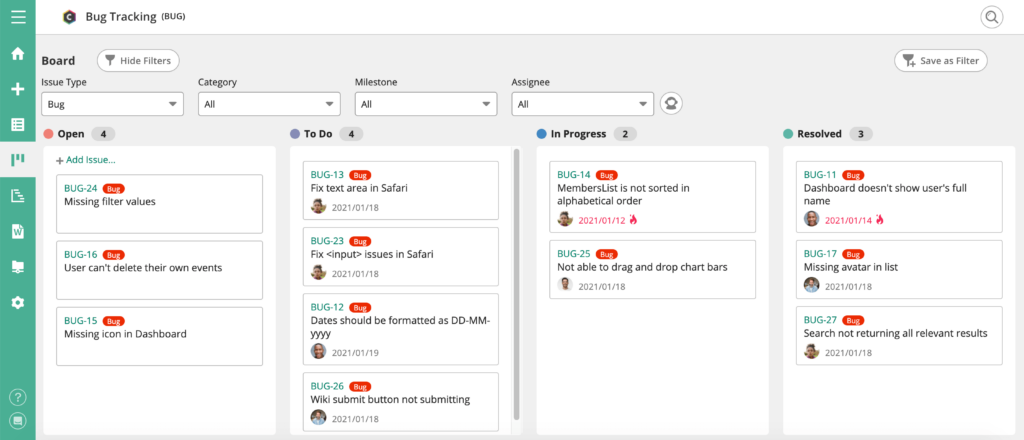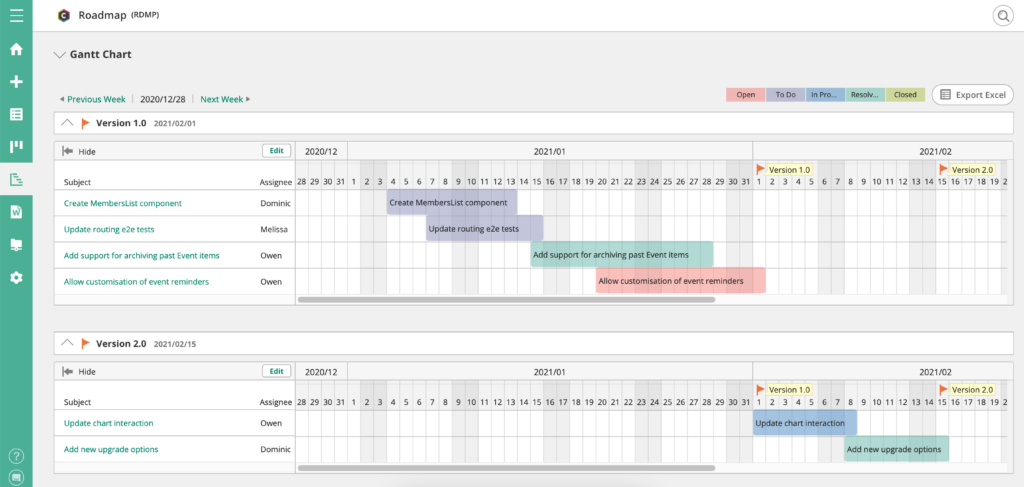In my Backlog in-depth review, I’m sharing the results of my analysis and evaluation from hands-on testing and experimentation. Before we dive in, if you’re just starting your search for the best task management tools, you should first check out my pick of the best task management software. Backlog is one of the top-rated task management tools out there, but to figure out if it's a good match for you, it's important to understand its benefits and drawbacks.
My in-depth Backlog review will take you through everything you need to know to make a more informed decision—pros and cons, features and functionality, pricing, and more—to help you to better understand its capabilities and suitability for your needs.

Backlog: Product Overview
Backlog is a task management software designed to streamline project management, issue tracking, and version control in one platform. It primarily caters to development teams and project managers seeking a unified solution for managing tasks, bugs, and project progress.
The tool offers significant benefits by enhancing team members’ collaboration, improving project visibility, and ensuring efficient tracking of progress and issues.
It addresses common pain points such as disjointed communication, lack of transparency in project status, and cumbersome issue tracking. Key features of Backlog include its intuitive interface, comprehensive issue-tracking system, and robust version control capabilities.
Pros
- Intuitive Interface: Easy to Navigate. The simple, user-friendly design of Backlog's interface makes it easy for new users to adapt and navigate through the software.
- Issue Tracking: Detailed Tracking. Backlog excels in providing detailed issue tracking that allows teams to efficiently identify, categorize, and resolve issues.
- Version Control: Integrated Control. The integrated version control feature in Backlog ensures that all project versions are systematically managed and accessible.
Cons
- Customization Limits: Limited Flexibility. Backlog offers less customization compared to some of its competitors, which might limit its adaptability to specific project needs.
- Reporting Features: Basic Reporting. The reporting capabilities of Backlog are basic and might not suffice for teams needing advanced analytical insights.
- Mobile App: Basic App. The mobile application of Backlog lacks some features present in the desktop version, affecting its utility for on-the-go users.
Expert Opinion
In my experience, Backlog stands out in its simplicity and effectiveness, particularly in issue tracking and version control. However, when it comes to customization and advanced reporting features, it falls short compared to some of its competitors.
Its interface is straightforward, making onboarding and daily use less daunting for new users. Yet, for organizations requiring deep customization or extensive report generation, Backlog might not be the optimal choice. It is best suited for small to medium development teams who prioritize ease of use and efficient issue management over highly customizable interfaces and complex reporting.
In selecting a task management tool, it's crucial to balance the need for simplicity against the requirement for advanced features, and Backlog fits well for those valuing the former.
Backlog: A Deep Dive
Here's a deep dive into Backlog’s features, best use cases, pricing, customer support, and other purchase factors.
Standout Functionalities
- Integrated Version Control: Unique integration of version control in the platform for seamless tracking of code changes.
- Detailed Issue Tracking: Offers a more granular issue tracking system compared to typical task management tools.
- Native Wiki Feature: Built-in wiki functionality for centralized project documentation, uncommon in other task management software.
Other Key Features

- Integrated Version Control: Comprehensive tracking of code changes within the project management platform.
- Detailed Issue Tracking: Enhanced categorization and prioritization for efficient issue management.
- Gantt Charts: Visual project planning with clear understanding of timelines and dependencies.
- Kanban Boards: Visual task representation for improved workflow and management.
- Custom Fields: Allows customization of tasks for tailored project management experiences.
- Project Timelines: Useful for planning and monitoring project progress.
- Wiki Functionality: Internal documentation and knowledge sharing directly within the tool.
- Mobile App: Facilitates project management on the go with essential features.
- File Attachments and Document Sharing: Enhances collaboration and accessibility of documents.
- API Access: Enables integration with other tools and customization.
Product Specifications
| Task Assignment | Yes |
| Project Timelines | Yes |
| Kanban Boards | Yes |
| Gantt Charts | Yes |
| Time Tracking | Yes |
| Reporting Tools | Yes |
| Document Sharing | Yes |
| Calendar Integration | Yes |
| Email Notifications | Yes |
| Custom Fields | Yes |
| User Role Management | Yes |
| Mobile App | Yes |
| Cloud Storage | Yes |
| File Attachments | Yes |
| Issue Tracking | Yes |
| Version Control | Yes |
| Wiki Functionality | Yes |
| API Access | Yes |
| Third-Party Integrations | Yes |
| Multi-language Support | No |
| Real-Time Chat | No |
| Video Conferencing | No |
| CRM Integration | No |
| Automated Workflows | No |
| Social Media Integration | No |
Ease of Use
Backlog’s user interface is straightforward, making it accessible for users with varied levels of tech expertise. The onboarding process is simple, and navigating through the tool is intuitive. However, the vast range of features can be overwhelming for new users, and some aspects, like detailed issue tracking, might require a learning curve.
Customer Support
Backlog offers reliable customer support, with timely response times and multiple channels like email and live chat. They provide comprehensive documentation and tutorials, aiding users in troubleshooting and learning. However, the absence of 24/7 support or phone support can be a limitation for some users needing immediate assistance.
Software Integrations
Backlog offers several native integrations with popular tools like Slack, JIRA, and GitHub, enhancing its functionality. These integrations allow for streamlined workflows and better communication across platforms.
Backlog provides an API for custom integrations, catering to specific business needs. There are also add-ons available to extend the platform's capabilities, like Gantt chart plugins.
Backlog Pricing
Compared to similar tools, Backlog's pricing is competitive, especially considering its unique features like integrated version control and detailed issue tracking.
- Free Tier: $0/user/month. Offers basic features suitable for small teams.
- Starter Plan: $35/month (min 5 seats, billed annually). Includes essential project management features.
- Standard Plan: $100/month (min 10 seats, billed annually). Adds Gantt charts and advanced capabilities.
- Premium Plan: $175/month (min 10 seats, billed annually). Offers full feature access and larger storage.
- Enterprise Plan: Pricing upon request. Customizable solutions for large organizations.
Backlog Use Cases
Backlog has a lot to offer, but it may not be the best fit for your particular use case. Here are my thoughts on the types of organizations that would benefit from Backlog, and those that likely wouldn't.
Who would be a good fit for Backlog?
Backlog is a good fit for small to medium-sized development teams and project managers who need an integrated solution for task management, version control, and issue tracking. It works well for teams that require a straightforward tool with robust project management capabilities. Its loyal customers appreciate the simplicity and comprehensive issue tracking.
Who would be a bad fit for Backlog?
Backlog might not be suitable for large enterprises requiring highly customizable platforms or advanced CRM and automated workflow features. It may also not be the best fit for teams that rely heavily on real-time communication tools like chat and video
Backlog FAQs
Here are some answers to frequently asked questions you may have about Backlog:
What platforms does Backlog support
Backlog is available on web browsers and has mobile applications for both iOS and Android.
Can Backlog integrate with other tools?
Yes, Backlog offers integrations with several tools including Slack, JIRA, and GitHub, and also provides an API for further integrations.
Is there a free version of Backlog?
Yes, Backlog offers a free tier with basic features suitable for small teams.
Does Backlog support version control?
Yes, Backlog uniquely integrates version control directly within its platform.
Can I track the time spent on tasks in Backlog?
Yes, Backlog includes time tracking features for tasks and projects.
Does Backlog offer project planning tools like Gantt charts?
Yes, Backlog provides Gantt charts for visual project planning and management.
How is the customer support for Backlog?
Backlog provides customer support via email, live chat, and extensive documentation, although it lacks 24/7 phone support.
Are there customization options in Backlog?
Backlog allows for some customization, including custom fields in tasks, but may have limitations compared to some other platforms.
Backlog Company Overview & History
Backlog, developed by Nulab, is a task management software designed to facilitate project management, issue tracking, and version control. It's used by a variety of companies, particularly those in software development and project management. Nulab, a software company, owns and operates Backlog.
The headquarters of Nulab is located in Fukuoka, Japan. While there are no publicly noted notable employees or advisors, the company prides itself on creating collaborative software solutions. The mission statement of Nulab focuses on enhancing teamwork and collaboration through intuitive software solutions.
Since its inception, Backlog has achieved notable milestones, including significant global user adoption and the introduction of key features like integrated version control and detailed issue tracking.
Backlog Summary: The Bottom Line
In my view, Backlog stands out for its integration of version control and detailed issue tracking within a task management platform. It's not common to find this unique combination in similar software.
What's particularly good about Backlog is its user-friendly interface and the inclusion of project planning tools like Gantt charts and Kanban boards. Its most noteworthy features include integrated version control, detailed issue tracking, and native wiki functionality.
Alternatives to Backlog
If Backlog doesn't seem like the perfect fit for your needs, here are a few similar task management systems you may want to consider instead:
- Trello: Best for visual task management using Kanban boards.
- Asana: Suited for teams seeking more robust workflow customization and automated features.
- JIRA: Ideal for larger teams or enterprises needing advanced project management, especially in agile software development.
If you're still unsure which alternative to choose, check out other task management alternatives.
Summary
This review provides a comprehensive look at Backlog, highlighting its unique features like integrated version control and detailed issue tracking. While it shines in its simplicity and specific functionalities, it may not suit every organization's needs, particularly those requiring advanced customization.
Backlog is a strong contender in the task management software arena, especially for small to medium development teams. If you're considering Backlog or have used it, your insights and experiences would be invaluable.
Feel free to share your thoughts and contribute to this discussion.
